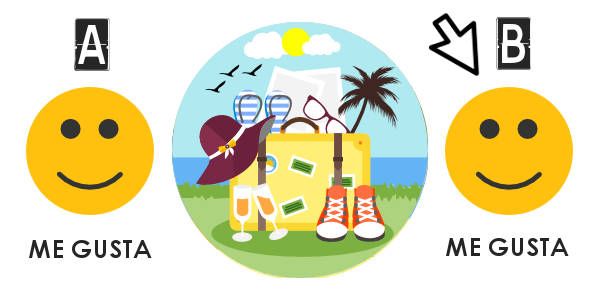EXPRESAR
SENTIMIENTOS, GUSTOS E INTERESES
Existe un grupo de verbos en español que se conjuga casi
siempre en 3º persona. Estos verbos van siempre acompañados de los pronombres
de objeto directo (me, te, le, nos, os, les) y expresan sentimientos y opiniones
respecto a cosas, personas o actividades.
Lee estas frases:
Afirmativa
- Me gusta el
teatro.
- I like theatre.
- I like theatre.
Negativa
- No me gusta Justin
Beiber
- I don’t like Justin Beiber
- I don’t like Justin Beiber
Interrogativa
- Pablo: ¿Te
gusta Shakira? Paul: Do you like
Shakira?
- Pedro: ¡Por supuesto! Peter: Of course!
- Pedro: ¡Por supuesto! Peter: Of course!
Examinemos estos pares
de frases con más detalle:
Me --> objeto
indirecto
gusta --> verbo
el teatro --> sujeto
gusta --> verbo
el teatro --> sujeto
I --> sujeto
like ---> verbo
theatre ---> objeto directo
like ---> verbo
theatre ---> objeto directo
Como puedes ver la
construcción es opuesta. En español el sujeto de este tipo de verbos es la
cosa, persona o actividad que provoca el sentimiento (el teatro) mientras que
el objeto indirecto es la persona que tiene el sentimiento (me = ‘yo’). Una
traducción literal de esta idea en inglés sería algo así como Theatre is
pleasing to me, donde el sujeto es “theatre”, el verbo es “is pleasing” y el
objeto de persona es “to me”.
Más ejemplos para
comparación entre español e inglés:
Gustos:
LIKES
1. ¡Me encantan los
donuts! Especialmente los de Dunkin Donuts. ¿Te gustan los de mermelada?
-I love doughnuts! Especially from Dunkin Donuts. Do you like the ones with jam in?
-I love doughnuts! Especially from Dunkin Donuts. Do you like the ones with jam in?
2. Anne: Hugh Grant me vuelve loca. ¡Está buenísimo! Sarah: ¿Quéee? ¡Tiene más de 50!
Anne: I’m crazy about Hugh Grant. He’s gorgeous! Sarah: Whaaaat? He’s like over 50!
Anne: I’m crazy about Hugh Grant. He’s gorgeous! Sarah: Whaaaat? He’s like over 50!
3. Los efectos especiales de ‘Misión Imposible’ me fascinan.
- I really love the special effects in ‘Mission Impossible’.
- I really love the special effects in ‘Mission Impossible’.
DISLIKES
- ¡Odio a Justin Beiber! ¡Es una nenaza!
- I hate Justin Beiber! He’s such a wimp!
- I hate Justin Beiber! He’s such a wimp!
- ¡No soporto ‘Friends’, cuentan siempre los mismos chistes en cada
episodio y el tema principal me pone enfermo!
- I can’t stand ‘Friends’, they say the same jokes every episode and the theme tune drives me mad!
- I can’t stand ‘Friends’, they say the same jokes every episode and the theme tune drives me mad!
- He oído que Rafa Nadal
odia todos los deportes a parte del tenis… ¡Detesta el
baloncesto!
- I heard that Rafa Nadal hates every other sport apart from tennis….He loathes basketball!
- I heard that Rafa Nadal hates every other sport apart from tennis….He loathes basketball!
Sentimientos
FEELINGS
- Esta película me
aburre. ¿La dejamos?
- I’m bored with this film. Shall we walk out?
- I’m bored with this film. Shall we walk out?
- Me apetece un pizza de piña. ¿Y a ti? ¿Te apetece una?
- I feel like having a pizza with pineapple on top. How about you? Do you feel like one?
- I feel like having a pizza with pineapple on top. How about you? Do you feel like one?
- No te preocupes. No importa.
- Don’t worry. It doesn’t matter
- Don’t worry. It doesn’t matter
Intereses:
INTERESTS
- Me gusta mucho
Harry Potter, pero prefiero los libros… no las películas. ¿A ti te gusta Harry
Potter?
- I’m really into Harry Potter, but I prefer the books… not the films. Are you into Harry Potter?
- I’m really into Harry Potter, but I prefer the books… not the films. Are you into Harry Potter?
- No me interesa ‘Twilight’… ¡Robert Pattinson no es tan guapo!
- I’m just not interested in ‘Twilight’…Robert Pattinson isn’t that good looking!
- I’m just not interested in ‘Twilight’…Robert Pattinson isn’t that good looking!
- No me atrae el arte
abstracto, ¡no tiene ningún sentido!
- Abstract art doesn’t appeal to me. It doesn’t make any sense!
- Abstract art doesn’t appeal to me. It doesn’t make any sense!
ejercicios
LIKES AND DISLIKES
Objective: The use of Like and dislike plus noun and verb.
The verbs "like and dislike" can be followed by a noun.
For example:
I like apples
|
I like strawberries
|
like +
|
Noun
| |
I
you
we
they
|
like
dislike
|
soccer
the beach
Mexican food
|
he
she
it
|
likes
dislikes
|
music

chinese food

milk
 |
They also can be followed by another verb.
For example:
I like swimming
 |
I like dancing
|
I like reading
|
I like singing
 |
When like/Dislike are followed by a verb you need to add  ing ending to the verbs.
ing ending to the verbs.
I
you
we
they
|
like
dislike
|
playing soccer
going to the beach
eating Mexican food
drinking orange juice
|
he
she
it
|
likes
dislikes
|
listening music
cooking chinese food
reading tales.
|


No hay comentarios:
Publicar un comentario